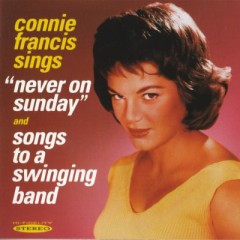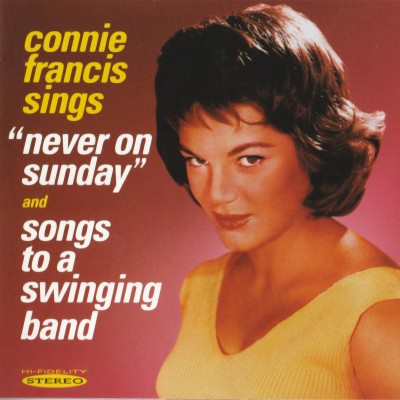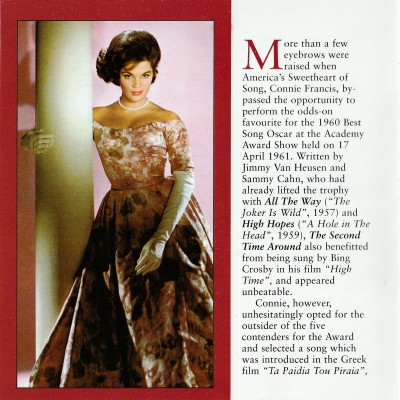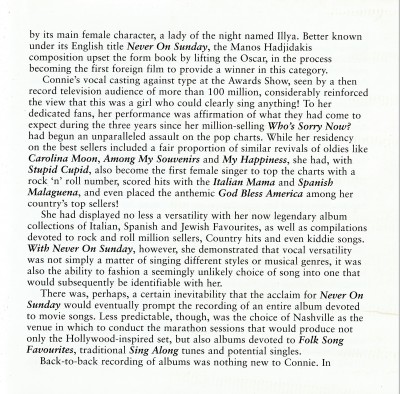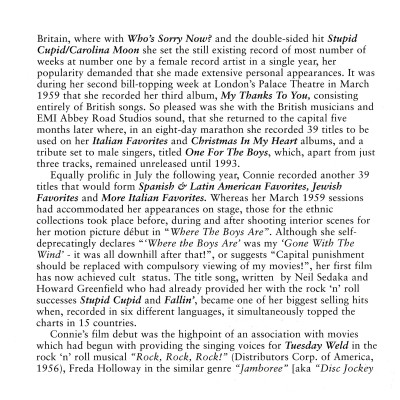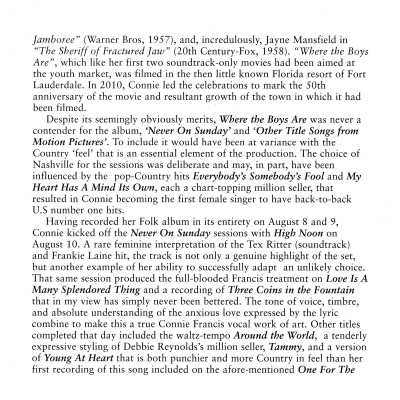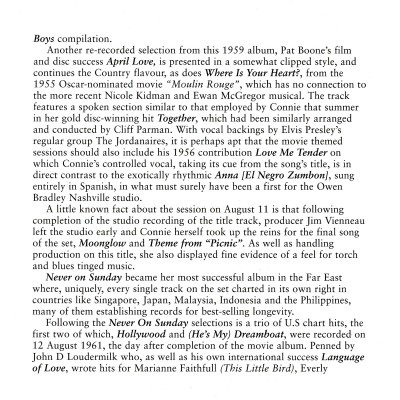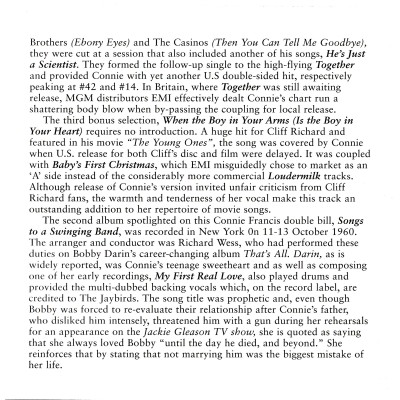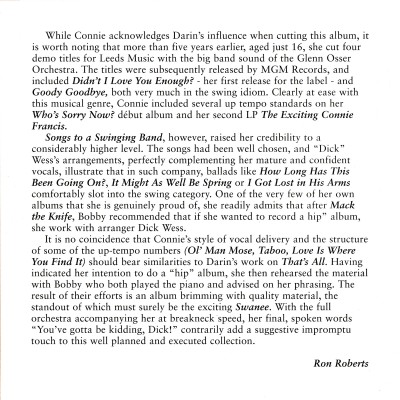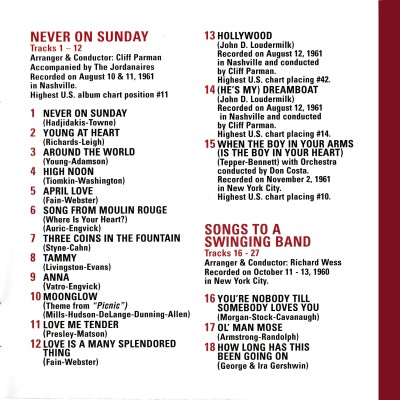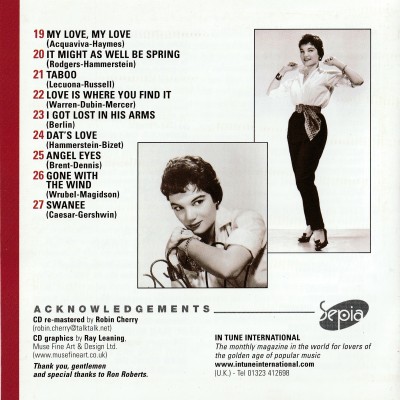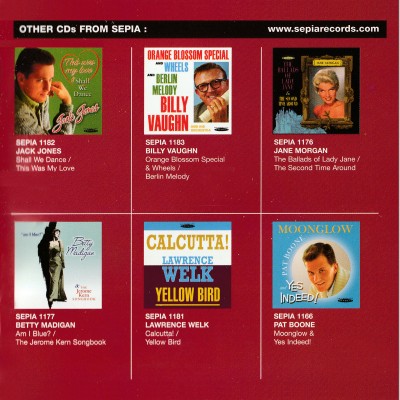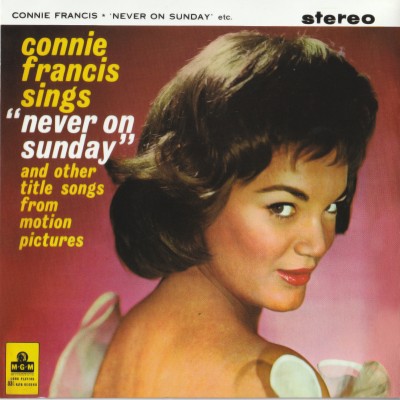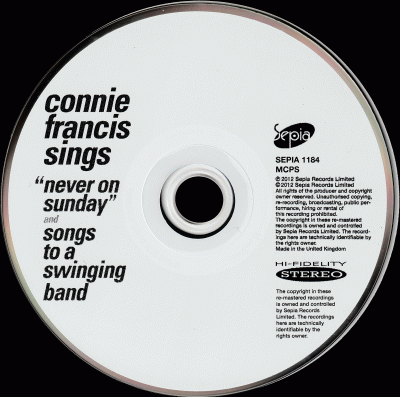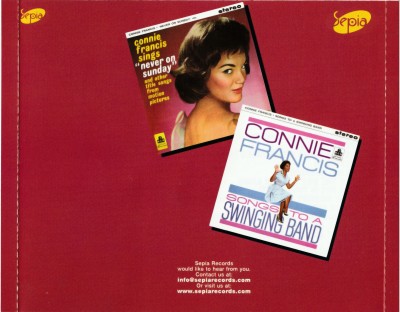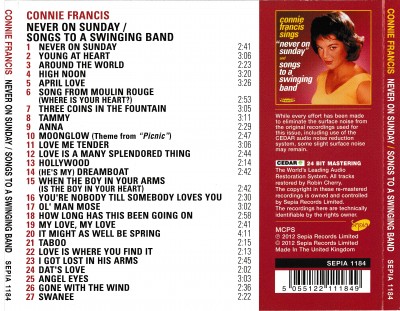NEVER ON SUNDAY / SONGS TO A SWINGING BAND
More than a few eyebrows were raised when America’s Sweetheart of Song, Connie Francis, by-passed the opportunity to perform the odds-on favourite for the 1960 Best Song Oscar at the Academy Award Show held on 17 April 1961. Written by Jimmy Van Heusen and Sammy Cahn, who had already lifted the trophy with All The Way (“The Joker Is Wild”, 1957) and High Hopes (“A Hole in The Head”, 1959), The Second Time Around also benefitted from being sung by Bing Crosby in his film “High Time”, and appeared unbeatable.
Connie, however, unhesitatingly opted for the outsider of the five contenders for the Award and selected a song which was introduced in the Greek film "Ta Paidia Tou Piraia", by its main female character, a lady of the night named Illya. Better known under its English title Never On Sunday, the Manos Hadjidakis composition upset the form book by lifting the Oscar, in the process becoming the first foreign film to provide a winner in this category.
Connie’s vocal casting against type at the Awards Show, seen by a then record television audience of more than 100 million, considerably reinforced the view that this was a girl who could clearly sing anything! To her dedicated fans, her performance was affirmation of what they had come to expect during the three years since her million-selling Who’s Sorry Now? had begun an unparalleled assault on the pop charts. While her residency on the best sellers included a fair proportion of similar revivals of oldies like Carolina Moon, Among My Souvenirs and My Happiness, she had, with Stupid Cupid, also become the first female singer to top the charts with a rock ‘n’ roll number, scored hits with the Italian Mama and Spanish Malaguena, and even placed the anthemic God Bless America among her country’s top sellers!
She had displayed no less a versatility with her now legendary album collections of Italian, Spanish and Jewish Favourites, as well as compilations devoted to rock and roll million sellers, Country hits and even kiddie songs. With Never On Sunday, however, she demonstrated that vocal versatility was not simply a matter of singing different styles or musical genres, it was also the ability to fashion a seemingly unlikely choice of song into one that would subsequently be identifiable with her.
There was, perhaps, a certain inevitability that the acclaim for Never On Sunday would eventually prompt the recording of an entire album devoted to movie songs. Less predictable, though, was the choice of Nashville as the venue in which to conduct the marathon sessions that would produce not only the Hollywood-inspired set, but also albums devoted to Folk Song Favourites, traditional Sing Along tunes and potential singles.
Back-to-back recording of albums was nothing new to Connie. In Britain, where with Who’s Sorry Now? and the double-sided hit Stupid Cupid/Carolina Moon she set the still existing record of most number of weeks at number one by a female record artist in a single year, her popularity demanded that she made extensive personal appearances. It was during her second bill-topping week at London’s Palace Theatre in March 1959 that she recorded her third album, My Thanks To You, consisting entirely of British songs. So pleased was she with the British musicians and EMI Abbey Road Studios sound, that she returned to the capital five months later where, in an eight-day marathon she recorded 39 titles to be used on her Italian Favorites and Christmas In My Heart albums, and a tribute set to male singers, titled One For The Boys, which, apart from just three tracks, remained unreleased until 1993.
Equally prolific in July the following year, Connie recorded another 39 titles that would form Spanish & Latin American Favorites, Jewish Favorites and More Italian Favorites. Whereas her March 1959 sessions had accommodated her appearances on stage, those for the ethnic collections took place before, during and after shooting interior scenes for her motion picture début in “Where The Boys Are”. Although she self-deprecatingly declares “’Where the Boys Are’ was my ‘Gone With The Wind’ – it was all downhill after that!”, or suggests “Capital punishment should be replaced with compulsory viewing of my movies!”, her first film has now achieved cult status. The title song, written by Neil Sedaka and Howard Greenfield who had already provided her with the rock ‘n’ roll successes Stupid Cupid and Fallin’, became one of her biggest selling hits when, recorded in six different languages, it simultaneously topped the charts in 15 countries.
Connie’s film debut was the highpoint of an association with movies which had begun with providing the singing voices for Tuesday Weld in the rock ‘n’ roll musical “Rock, Rock, Rock!” (Distributors Corp. of America, 1956), Freda Holloway in the similar genre “Jamboree” [aka “Disc Jockey Jamboree” (Warner Bros, 1957), and, incredulously, Jayne Mansfield in “The Sheriff of Fractured Jaw” (20th Century-Fox, 1958). “Where the Boys Are”, which like her first two soundtrack-only movies had been aimed at the youth market, was filmed in the then little known Florida resort of Fort Lauderdale. In 2010, Connie led the celebrations to mark the 50th anniversary of the movie and resultant growth of the town in which it had been filmed.
Despite its seemingly obviously merits, Where the Boys Are was never a contender for the album, ‘Never On Sunday’ and Other Title Songs from Motion Pictures’. To include it would have been at variance with the Country ‘feel’ that is an essential element of the production. The choice of Nashville for the sessions was deliberate and may, in part, have been influenced by the pop-Country hits Everybody’s Somebody’s Fool and My Heart Has A Mind Its Own, each a chart-topping million seller, that resulted in Connie becoming the first female singer to have back-to-back U.S number one hits.
Having recorded her Folk album in its entirety on August 8 and 9, Connie kicked off the Never On Sunday sessions with High Noon on August 10. A rare feminine interpretation of the Tex Ritter (soundtrack) and Frankie Laine hit, the track is not only a genuine highlight of the set, but another example of her ability to successfully adapt an unlikely choice. That same session produced the full-blooded Francis treatment on Love Is A Many Splendored Thing and a recording of Three Coins in the Fountain that in my view has simply never been bettered. The tone of voice, timbre, and absolute understanding of the anxious love expressed by the lyric combine to make this a true Connie Francis vocal work of art. Other titles completed that day included the waltz-tempo Around the World, a tenderly expressive styling of Debbie Reynolds’s million seller, Tammy, and a version of Young At Heart that is both punchier and more Country in feel than her first recording of this song included on the afore-mentioned One For The Boys compilation.
Another re-recorded selection from this 1959 album, Pat Boone’s film and disc success April Love, is presented in a somewhat clipped style, and continues the Country flavour, as does Where Is Your Heart?, from the 1955 Oscar-nominated movie “Moulin Rouge”, which has no connection to the more recent Nicole Kidman and Ewan McGregor musical. The track features a spoken section similar to that employed by Connie that summer in her gold disc-winning hit Together, which had been similarly arranged and conducted by Cliff Parman. With vocal backings by Elvis Presley’s regular group The Jordanaires, it is perhaps apt that the movie themed sessions should also include his 1956 contribution Love Me Tender on which Connie’s controlled vocal, taking its cue from the song’s title, is in direct contrast to the exotically rhythmic Anna [El Negro Zumbon], sung entirely in Spanish, in what must surely have been a first for the Owen Bradley Nashville studio.
A little known fact about the session on August 11 is that following completion of the studio recording of the title track, producer Jim Vienneau left the studio early and Connie herself took up the reins for the final song of the set, Moonglow and Theme from “Picnic”. As well as handling production on this title, she also displayed fine evidence of a feel for torch and blues tinged music.
Never on Sunday became her most successful album in the Far East where, uniquely, every single track on the set charted in its own right in countries like Singapore, Japan, Malaysia, Indonesia and the Philippines, many of them establishing records for best-selling longevity.
Following the Never On Sunday selections is a trio of U.S chart hits, the first two of which, Hollywood and (He’s My) Dreamboat, were recorded on 12 August 1961, the day after completion of the movie album. Penned by John D Loudermilk who, as well as his own international success Language of Love, wrote hits for Marianne Faithfull (This Little Bird), Everly Brothers (Ebony Eyes) and The Casinos (Then You Can Tell Me Goodbye), they were cut at a session that also included another of his songs, He’s Just a Scientist. They formed the follow-up single to the high-flying Together and provided Connie with yet another U.S double-sided hit, respectively peaking at #42 and #14. In Britain, where Together was still awaiting release, MGM distributors EMI effectively dealt Connie’s chart run a shattering body blow when by-passing the coupling for local release.
The third bonus selection, When the Boy in Your Arms (Is the Boy in Your Heart) requires no introduction. A huge hit for Cliff Richard and featured in his movie “The Young Ones”, the song was covered by Connie when U.S. release for both Cliff’s disc and film were delayed. It was coupled with Baby’s First Christmas, which EMI misguidedly chose to market as an ‘A’ side instead of the considerably more commercial Loudermilk tracks. Although release of Connie’s version invited unfair criticism from Cliff Richard fans, the warmth and tenderness of her vocal make this track an outstanding addition to her repertoire of movie songs.
The second album spotlighted on this Connie Francis double bill, Songs to a Swinging Band, was recorded in New York 0n 11-13 October 1960. The arranger and conductor was Richard Wess, who had performed these duties on Bobby Darin’s career-changing album That’s All. Darin, as is widely reported, was Connie’s teenage sweetheart and as well as composing one of her early recordings, My First Real Love, also played drums and provided the multi-dubbed backing vocals which, on the record label, are credited to The Jaybirds. The song title was prophetic and, even though Bobby was forced to re-evaluate their relationship after Connie’s father, who disliked him intensely, threatened him with a gun during her rehearsals for an appearance on the Jackie Gleason TV show, she is quoted as saying that she always loved Bobby "until the day he died, and beyond." She reinforces that by stating that not marrying him was the biggest mistake of her life.
While Connie acknowledges Darin’s influence when cutting this album, it is worth noting that more than five years earlier, aged just 16, she cut four demo titles for Leeds Music with the big band sound of the Glenn Osser Orchestra. The titles were subsequently released by MGM Records, and included Didn’t I Love You Enough? – her first release for the label – and Goody Goodbye, both very much in the swing idiom. Clearly at ease with this musical genre, Connie included several up tempo standards on her Who’s Sorry Now? début album and her second LP The Exciting Connie Francis.
Songs to a Swinging Band, however, raised her credibility to a considerably higher level. The songs had been well chosen, and “Dick” Wess’s arrangements, perfectly complementing her mature and confident vocals, illustrate that in such company, ballads like How Long Has This Been Going On?, It Might As Well Be Spring or I Got Lost in His Arms comfortably slot into the swing category. One of the very few of her own albums that she is genuinely proud of, she readily admits that after Mack the Knife, Bobby recommended that if she wanted to record a hip” album, she work with arranger Dick Wess.
It is no coincidence that Connie’s style of vocal delivery and the structure of some of the up-tempo numbers (Ol’ Man Mose, Taboo, Love Is Where You Find It) should bear similarities to Darin’s work on That’s All. Having indicated her intention to do a “hip” album, she then rehearsed the material with Bobby who both played the piano and advised on her phrasing. The result of their efforts is an album brimming with quality material, the standout of which must surely be the exciting Swanee. With the full orchestra accompanying her at breakneck speed, her final, spoken words “You’ve gotta be kidding, Dick!” contrarily add a suggestive impromptu touch to this well planned and executed collection.
Ron Roberts






